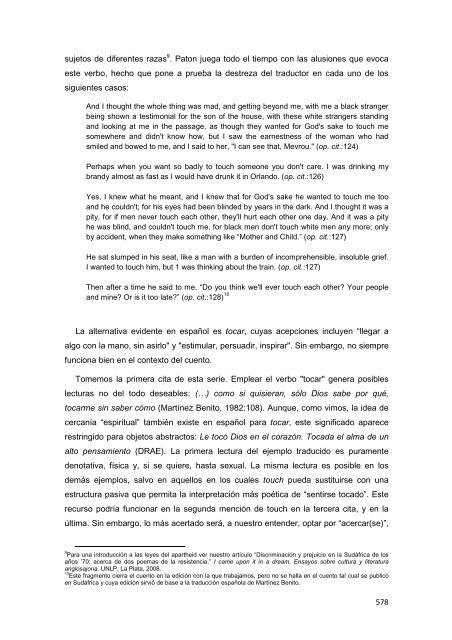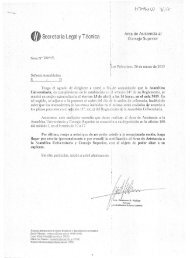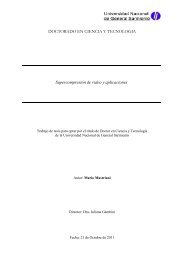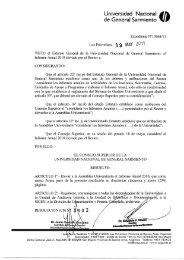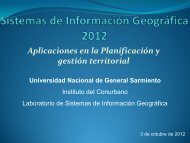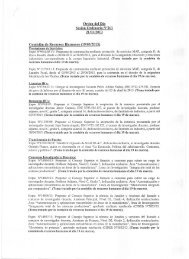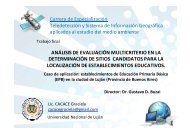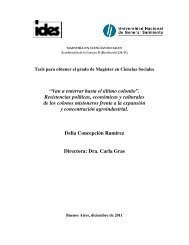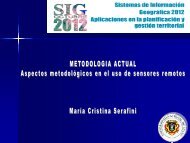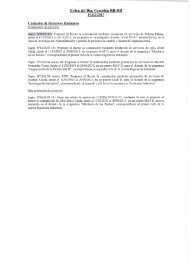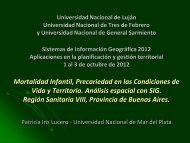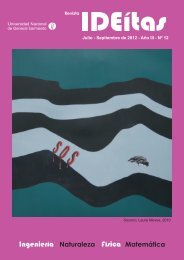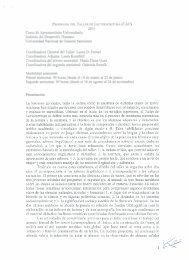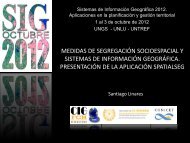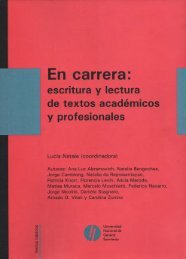- Page 1:
ISSN 2314-2235 Instituto del Desarr
- Page 4 and 5:
Comité Académico Elvira Narvaja d
- Page 6 and 7:
Universidad de Buenos Aires LA DIST
- Page 8 and 9:
LA ESCENIFICACIÓN DEL AMOR A LA PA
- Page 10 and 11:
Facultad de Lenguas. Universidad Na
- Page 12 and 13:
Escritura y pensamiento crítico…
- Page 14 and 15:
LA PERSPECTIVA LÉXICO-GRAMATICAL E
- Page 16 and 17:
LEER EN EL INGRESO A LA UNIVERSIDAD
- Page 18 and 19:
LAS ESTRATEGIAS DE LECTURA DE FUENT
- Page 20 and 21:
ETHOS PEDAGÓGICO-EXPERTO DE LA SEN
- Page 22 and 23:
12. Crítica genética La organizac
- Page 24 and 25:
Contacto de lenguas: del análisis
- Page 26 and 27:
variedades que representan, observa
- Page 28 and 29:
5- Trajeron un toro mecánico, un m
- Page 30 and 31:
muestran las “obsesiones” grama
- Page 32 and 33:
Mariana: Y así le ha pasado a todo
- Page 34 and 35:
9. Bibliografía Alarcos Llorach, E
- Page 36 and 37:
11, 12 y 13 de agosto de 2010 Bibli
- Page 38 and 39:
Entre todas las variedades que pued
- Page 40 and 41:
11, 12 y 13 de agosto de 2010 Bibli
- Page 42 and 43:
acompañado por las teorías lingü
- Page 44 and 45:
Copla anónima Kaballuta mana apis
- Page 46 and 47:
Don Matías (que no disimula su eno
- Page 48 and 49:
Referencias bibliográficas ALVARAD
- Page 50 and 51:
localidad de Merlo, en la provincia
- Page 52 and 53:
Morava 1995; Diver 1995; García 19
- Page 54 and 55:
6. Textos de aplicación: Son texto
- Page 56 and 57:
Referencias bibliográficas CONTINI
- Page 58 and 59:
11, 12 y 13 de agosto de 2010 Bibli
- Page 60 and 61:
Los valores epistemológicos que en
- Page 62 and 63:
este reportativo, aunque nos inclin
- Page 64 and 65:
La mayor frecuencia de aparición d
- Page 66 and 67:
Texto histórico narrado por Luis C
- Page 68 and 69:
Schmid, Theophilus (1910) Two lingu
- Page 70 and 71:
el país: los xinka y los garífuna
- Page 72 and 73:
marginación y agravio de la que er
- Page 74 and 75:
de milpa, ahí remojando Øi y comi
- Page 76 and 77:
característico de las zonas de con
- Page 78 and 79:
nuevo valor que la autora denomina
- Page 80 and 81:
Referencias bibliográficas Buenros
- Page 82 and 83:
11, 12 y 13 de agosto de 2010 Bibli
- Page 84 and 85:
El aprendizaje de lenguas en contex
- Page 86 and 87:
Escena I: 1. Pesq: (...) ↑então
- Page 88 and 89:
En este sentido es posible observar
- Page 90 and 91:
Referencias Bibliográficas COOK, V
- Page 92 and 93:
11, 12 y 13 de agosto de 2010 Bibli
- Page 94 and 95:
unos minutos para su concepto del u
- Page 96 and 97:
que se ha olvidado que lo son; met
- Page 98 and 99:
es, en consecuencia, “generativa
- Page 100 and 101:
no por la mera habilidad de generar
- Page 102 and 103:
Referencias bibliográficas Borges,
- Page 104 and 105:
paradigmáticas observadas y cierta
- Page 106 and 107:
¿Qué es lo etnopragmáticamente m
- Page 108 and 109:
Salvo en registros especializados,
- Page 110 and 111:
1.3. El español en zona de sustrat
- Page 112 and 113:
a nuestros resultados. Nos hemos ce
- Page 114 and 115:
11, 12 y 13 de agosto de 2010 Bibli
- Page 116 and 117:
2. El español andino de Buenos Air
- Page 118 and 119:
a). pe~pes~pues, en posición final
- Page 120 and 121:
4. “Ea, PUES, amiga, dixo una de
- Page 122 and 123:
Referencias bibliográficas APPEL,
- Page 124 and 125:
11, 12 y 13 de agosto de 2010 Bibli
- Page 126 and 127:
castellano, se les preguntó por la
- Page 128 and 129:
Entrevistas a los alumnos Han parti
- Page 130 and 131:
• Trabajar contenidos de ciencias
- Page 132 and 133:
Segundo momento Puesta en común: c
- Page 134 and 135:
11, 12 y 13 de agosto de 2010 Bibli
- Page 136 and 137:
enunciado, al que puede haber acced
- Page 138 and 139:
Por otra parte, esta lengua posee u
- Page 140 and 141:
Por el contrario, la información e
- Page 142 and 143:
que manifiestan mayor conocimiento
- Page 144 and 145:
con el sistema evidencial por el cu
- Page 146 and 147:
6. Referencias bibliográficas ACHA
- Page 148 and 149:
11, 12 y 13 de agosto de 2010 Bibli
- Page 150 and 151:
“inexpresividad”, “falta de e
- Page 152 and 153:
En relación con la escritura, las
- Page 154 and 155:
Si bien las cuestiones relacionadas
- Page 156 and 157:
Referencias bibliográficas AA.VV.
- Page 158 and 159:
11, 12 y 13 de agosto de 2010 Bibli
- Page 160 and 161:
Según datos del IDESCAT 3 , en el
- Page 162 and 163:
Desde nuestra perspectiva, se hizo
- Page 164 and 165:
Fragmento 2: En clase de inglés 1.
- Page 166 and 167:
Referencias bibliográficas Androut
- Page 168 and 169:
Literatura e integración regional
- Page 170 and 171:
econocimiento continental, además
- Page 172 and 173:
la consecuente difusión y visibili
- Page 174 and 175:
persistente interés de los escrito
- Page 176 and 177:
la prosa, sobre todo en el prólogo
- Page 178 and 179:
VOLPI, Jorge (2009) El insomnio de
- Page 180 and 181:
La propuesta de esta ponencia es co
- Page 182 and 183:
principios estéticos que atraigan
- Page 184 and 185:
que prima el valor de lo económico
- Page 186 and 187:
11, 12 y 13 de agosto de 2010 Bibli
- Page 188 and 189:
ponderó estrategias de representac
- Page 190 and 191:
de supervivencia” de la “peque
- Page 192 and 193:
trascenderlos para poder imaginar s
- Page 194 and 195:
OSORIO, Nelson. “Estudios latinoa
- Page 196 and 197:
en muchos casos por una retórica f
- Page 198 and 199:
Álvar Núñez realiza David Lagman
- Page 200 and 201:
donde podría resultar más evident
- Page 202 and 203:
su identidad mantenida; no entiendo
- Page 204 and 205:
11, 12 y 13 de agosto de 2010 Bibli
- Page 206 and 207:
el Uruguay la narrativa de Mario Be
- Page 208 and 209:
obligaron a la gente a bajar hacia
- Page 210 and 211:
multiplicidad de lunfardismos como
- Page 212 and 213:
Panel Lecturas y escrituras en leng
- Page 214 and 215:
este modo su relación con el lecto
- Page 216 and 217:
egularly visit flowers and pollinat
- Page 218 and 219:
Sugerencias y Recomendaciones El au
- Page 220 and 221:
Referencias bibliográficas FRANKIE
- Page 222 and 223:
han sido avaladas por la Comisión
- Page 224 and 225:
humanos, los pares o del docente-me
- Page 226 and 227:
participación crítica en un coloq
- Page 228 and 229:
en los cambios observables en los p
- Page 230 and 231:
Referencias bibliográficas BAJTÍN
- Page 232 and 233:
Mesas temáticas
- Page 234 and 235:
11, 12 y 13 de agosto de 2010 Bibli
- Page 236 and 237:
natural. Parte del proceso para res
- Page 238 and 239:
Albuquerque) afirma que escribe por
- Page 240 and 241:
El poema es muy político en un sen
- Page 242 and 243:
Referencias bibliográficas BRUCHAC
- Page 244 and 245:
Durante la esclavitud a los esclavo
- Page 246 and 247:
Este poema presenta una estructura
- Page 248 and 249:
de your), caída de grupos consoná
- Page 250 and 251:
se asocia al concepto de lirismo. S
- Page 252 and 253:
11, 12 y 13 de agosto de 2010 Bibli
- Page 254 and 255:
Sin embargo, al negar sus raíces y
- Page 256 and 257:
En el otro recuerdo que vuelve a su
- Page 258 and 259:
Referencias bibliográficas ELLISON
- Page 260 and 261:
efugio para la comunidad negra en l
- Page 262 and 263:
El poder retórico de los dos verso
- Page 264 and 265:
I know why the caged bird sings, ah
- Page 266 and 267:
Referencias bibliográficas BORSHUK
- Page 268 and 269:
en el trabajo constante de reinvenc
- Page 270 and 271:
encarnada en el personaje de Harlen
- Page 272 and 273:
it wasn´t a good idea to ask. But
- Page 274 and 275:
Por último, las historias orales q
- Page 276 and 277:
Literatura y educación Coordinaci
- Page 278 and 279:
incluye una serie de cuentos fantá
- Page 280 and 281:
literaria a través de una alta fre
- Page 282 and 283:
abierta […] El inicio y desenlace
- Page 284 and 285:
Referencias bibliográficas LÓPEZ
- Page 286 and 287:
En nuestro trabajo de selección de
- Page 288 and 289:
a su hija carta” ligadas a tipos
- Page 290 and 291:
El cuarto manual con el que trabaja
- Page 292 and 293:
Cuadro 6 “El caso del Rubens roba
- Page 294 and 295:
Borges o Cortázar. En el caso de l
- Page 296 and 297:
11, 12 y 13 de agosto de 2010 Bibli
- Page 298 and 299:
A los alumnos ingresantes, explica
- Page 300 and 301:
‘civilización’ / ‘barbarie
- Page 302 and 303:
apartados anteriores. Tampoco, como
- Page 304 and 305:
Algo similar a lo reseñado por Rey
- Page 306 and 307:
La escritura como práctica sociocu
- Page 308 and 309:
Un objetivo fundamental de nuestra
- Page 310 and 311:
escritos y re-escritos sin que exis
- Page 312 and 313:
un cementerio”. Desmontar estas v
- Page 314 and 315:
Por otro lado, este incidente permi
- Page 316 and 317:
Referencias bibliográficas BLAKE C
- Page 318 and 319:
provenientes de orígenes diversos:
- Page 320 and 321:
de los niños que participa en uno
- Page 322 and 323:
Ezequiel miran serios al perro, por
- Page 324 and 325:
Referencias bibliográficas AUYERO,
- Page 326 and 327:
11, 12 y 13 de agosto de 2010 Bibli
- Page 328 and 329:
Con todo, lo que parece quedar en e
- Page 330 and 331:
“dormir”, “previa”, “tele
- Page 332 and 333:
3-Los posibles que emergen en la es
- Page 334 and 335:
sentó a escribir lo que salía. La
- Page 336 and 337:
11, 12 y 13 de agosto de 2010 Bibli
- Page 338 and 339:
Otra propuesta contemporánea a la
- Page 340 and 341:
se apropian de las poéticas presen
- Page 342 and 343:
fueras él, teniendo en cuenta lo q
- Page 344 and 345:
Referencias bibliográficas ALVARAD
- Page 346 and 347:
11, 12 y 13 de agosto de 2010 Bibli
- Page 348 and 349:
audiencias” (Marafioti, 2010, p.
- Page 350 and 351:
efectos del discurso no contribuyen
- Page 352 and 353:
La exaltación del coraje se justif
- Page 354 and 355:
“Porque déjenme contarles, amigo
- Page 356 and 357:
Freud mencionaba tres actividades i
- Page 358 and 359:
Corpus de discursos extraídos de l
- Page 360 and 361:
dicotómicas en las que se apela al
- Page 362 and 363:
Latinoamérica procurando acentuar
- Page 364 and 365:
• el motivo del encuentro -inaugu
- Page 366 and 367:
evidenciar los procedimientos a tra
- Page 368 and 369:
Referencias bibliográficas AMOSSY,
- Page 370 and 371:
Gracias, muchas gracias. (APLAUSOS)
- Page 372 and 373:
En nombre de ellos, muchas gracias,
- Page 374 and 375:
“Argumentación y política: la c
- Page 376 and 377:
datos históricos que permiten que
- Page 378 and 379:
contraposición se observa en la se
- Page 380 and 381:
Si comparamos este discurso con los
- Page 382 and 383:
“se sustentaba en una estructura
- Page 384 and 385:
Referencias bibliográficas ANGENOT
- Page 386 and 387:
SUSTANTIVAR EL TRAUMA Mario Adrián
- Page 388 and 389:
terapeuta una forma privilegiada de
- Page 390 and 391:
traumático sino a extrañar otro l
- Page 392 and 393:
Trabajaremos ahora la persistencia
- Page 394 and 395:
Conclusión En relación a los obje
- Page 396 and 397:
11, 12 y 13 de agosto de 2010 Bibli
- Page 398 and 399:
asumida como una muestra efectiva d
- Page 400 and 401:
corporación médica. Los redactore
- Page 402 and 403:
por la Asociación Médica Bonaeren
- Page 404 and 405:
su órgano ó á este por aquella,
- Page 406 and 407:
sobre las poblaciones los mas aprec
- Page 408 and 409:
Análisis Económico del Derecho, s
- Page 410 and 411:
de su discurso muestra capacidad de
- Page 412 and 413:
compuesta por subordinadas, en part
- Page 414 and 415:
Por su parte, por repetición de se
- Page 416 and 417:
Oralidad y Escritura en los discurs
- Page 418 and 419:
del campo interaccional. Estas regu
- Page 420 and 421:
“verdadera” -puesto que tienen
- Page 422 and 423:
El cambio encierra en si una promes
- Page 424 and 425:
Ninguna de las citas que aparecen c
- Page 426 and 427:
Bibliografía citada ARNOUX, Elvira
- Page 428 and 429:
11, 12 y 13 de agosto de 2010 Bibli
- Page 430 and 431:
generaliza en el terreno internacio
- Page 432 and 433:
2) Pese a esa plétora de normas, h
- Page 434 and 435:
Referencias bibliográficas ALTHUSS
- Page 436 and 437:
provinciales y leyes generales de e
- Page 438 and 439:
estudiantes son “parcos, lentos,
- Page 440 and 441:
perspectiva pedagógica que destaca
- Page 442 and 443:
Referencias bibliográficas AUROUX,
- Page 444 and 445:
1. legislación sobre deberes y der
- Page 446 and 447:
condiciones de admisión son las mi
- Page 448 and 449:
comunicación digital (Internet), c
- Page 450 and 451:
permitieran el reconocimiento de es
- Page 452 and 453:
oficial, y diversos mecanismos para
- Page 454 and 455:
11, 12 y 13 de agosto de 2010 Bibli
- Page 456 and 457:
Cultura sorda Las personas sordas s
- Page 458 and 459:
En este contexto, se evidencia la i
- Page 460 and 461:
Referencias bibliográficas ALBERTI
- Page 462 and 463:
SIEGEL, L. (2000) “THE EDUCATIONA
- Page 464 and 465:
11, 12 y 13 de agosto de 2010 Bibli
- Page 466 and 467:
Sin embargo, el 58 % necesita “Le
- Page 468 and 469:
Por otra parte, los encuestados man
- Page 470 and 471:
Finalmente, el desafío será confo
- Page 472 and 473:
11, 12 y 13 de agosto de 2010 Bibli
- Page 474 and 475:
Las profesoras Di Stefano y Pereira
- Page 476 and 477:
La experiencia El proyecto se divid
- Page 478 and 479:
esponde a una concepción de proces
- Page 480 and 481:
Referencias bibliográficas ABRIC J
- Page 482 and 483:
encuesta con preguntas abiertas y c
- Page 484 and 485:
Los alumnos asocian leer y comprend
- Page 486 and 487:
Para nuestro análisis se tuvieron
- Page 488 and 489:
los mensajes de texto y el chat, g
- Page 490 and 491:
Referencias bibliográficas CARLINO
- Page 492 and 493:
acerca de la formación de grado, l
- Page 494 and 495:
al título obtenido por el sujeto c
- Page 496 and 497:
masificación en la matrícula de l
- Page 498 and 499:
Agrega además que “es factible a
- Page 500 and 501:
Anexo 1. Formación de grado Cantid
- Page 502 and 503:
Referencias bibliográficas AGUIRRE
- Page 504 and 505:
de comenzar el curso de ingreso a l
- Page 506 and 507:
cognitiva y de la lingüística tex
- Page 508 and 509:
Manifiesta haber recurrido a los pa
- Page 510 and 511:
escritura. Sólo el caso 5 muestra
- Page 512 and 513:
Referencias bibliográficas BEREITE
- Page 514 and 515:
Explorar estas representaciones per
- Page 516 and 517:
docente universitario, así como ac
- Page 518 and 519:
como la práctica de estos docentes
- Page 520 and 521:
BIBLIOGRAFÍA BAIN, Ken (2004), Lo
- Page 522 and 523:
11, 12 y 13 de agosto de 2010 Bibli
- Page 524 and 525:
disminuir con el paso del tiempo”
- Page 526 and 527:
historia”. La mayoría de ellos,
- Page 528 and 529: La vocación cristiana, ligada al s
- Page 530 and 531: Finalmente, podemos decir que en es
- Page 532 and 533: 11, 12 y 13 de agosto de 2010 Bibli
- Page 534 and 535: haciendo visibles las zonas de conf
- Page 536 and 537: La metáfora más recurrente es, nu
- Page 538 and 539: querer adquirir carta de ciudadaní
- Page 540 and 541: 11, 12 y 13 de agosto de 2010 Bibli
- Page 542 and 543: se limitara a concentrarse en la re
- Page 544 and 545: En efecto, el diario El Mundo 4 ape
- Page 546 and 547: Referencias bibliográficas BAJTIN,
- Page 548 and 549: 11, 12 y 13 de agosto de 2010 Bibli
- Page 550 and 551: II. Diferentes agentes que operan e
- Page 552 and 553: carbohidratos de baja calidad (golo
- Page 554 and 555: pruebas de comprensión estuvo rela
- Page 556 and 557: profeso un ir y venir entre las dos
- Page 558 and 559: normativos de la lengua, sino todo
- Page 560 and 561: ⎯⎯⎯(2009) “Una experiencia
- Page 562 and 563: 11, 12 y 13 de agosto de 2010 Bibli
- Page 564 and 565: el lector bilingüe se aproxima qui
- Page 566 and 567: otro, como indica Attardo (2001:122
- Page 568 and 569: expresa Borges (1932), entendemos q
- Page 570 and 571: 11, 12 y 13 de agosto de 2010 Bibli
- Page 572 and 573: infancia, más de la mitad de ellos
- Page 574 and 575: Por último, Foucault explica que l
- Page 576 and 577: es “veranda”, palabra provenien
- Page 580 and 581: Referencias bibliográficas AUGÉ,
- Page 582 and 583: los ejes temáticos, el recurso a l
- Page 584 and 585: Conradin Conradín the other two-fi
- Page 586 and 587: La explicativa alucinación Adolfo
- Page 588 and 589: Fácil es detectar la cadena semán
- Page 590 and 591: emocional—, con la imaginación c
- Page 592 and 593: Referencias bibliográficas BORGES,
- Page 594 and 595: publicada en el año 1991 por el se
- Page 596 and 597: contacto constitutivo de lenguas (i
- Page 598 and 599: efecto dramático diferente y una d
- Page 600 and 601: operación —el solapamiento de lo
- Page 602 and 603: ejemplo el sintagma nominal “El a
- Page 604 and 605: Hicks, Emily (1991) Border Writing.
- Page 606 and 607: 11, 12 y 13 de agosto de 2010 Bibli
- Page 608 and 609: y posturas, pide ser realizado (int
- Page 610 and 611: muchedumbre de carniceros, pero una
- Page 612 and 613: suceder. Sobre el recuadro general
- Page 614 and 615: Las seis viñetas restantes se dest
- Page 616 and 617: asadas en el misticismo de los diri
- Page 618 and 619: aporta nuevas miradas estéticas so
- Page 620 and 621: 620
- Page 622 and 623: volver a índice 622
- Page 624 and 625: 11, 12 y 13 de agosto de 2010 Bibli
- Page 626 and 627: publicación ancla en circunstancia
- Page 628 and 629:
literaria debe operar, aun para leg
- Page 630 and 631:
circulación y subsistencia, las re
- Page 632 and 633:
pero que tiene en la fundación de
- Page 634 and 635:
Bibliografía general FONDEBRIDER,
- Page 636 and 637:
Por caso, desde diferentes zonas de
- Page 638 and 639:
Escritura puesta en la calle En est
- Page 640 and 641:
En esa actividad el poeta comparte
- Page 642 and 643:
arrancás con tanta celestidad sien
- Page 644 and 645:
Referencias bibliográficas AGUILAR
- Page 646 and 647:
lector -especializado a veces, pero
- Page 648 and 649:
fantasma de la arbitrariedad y del
- Page 650 and 651:
Ramón Plaza en el prólogo: la ant
- Page 652 and 653:
Referencias bibliográficas ANDRÉS
- Page 654 and 655:
11, 12 y 13 de agosto de 2010 Bibli
- Page 656 and 657:
ecurren a un conjunto de fórmulas
- Page 658 and 659:
egión, contrarrestar la de otras p
- Page 660 and 661:
dinámico, en constitución, donde
- Page 662 and 663:
Caribe”. De esta manera, la UNASU
- Page 665 and 666:
11, 12 y 13 de agosto de 2010 Bibli
- Page 667 and 668:
• La Constitución Política del
- Page 669 and 670:
procedimientos de legitimación de
- Page 671 and 672:
del Estado” (Nº 6), en la que re
- Page 673 and 674:
Referencias bibliográficas AMOSSY
- Page 675 and 676:
discurso explícito por parte de es
- Page 677 and 678:
tras el acuerdo; como también es f
- Page 679 and 680:
una instancia colectiva, que está
- Page 681 and 682:
persecución de los militantes, el
- Page 683 and 684:
Referencias bibliográficas BOURDIE
- Page 685 and 686:
11, 12 y 13 de agosto de 2010 Bibli
- Page 687 and 688:
aprendizaje de contenidos específi
- Page 689 and 690:
controlada en forma consciente por
- Page 691 and 692:
Experiencias realizadas Los cursos
- Page 693 and 694:
http://www.airliners.net/aviation-f
- Page 695 and 696:
acercaron a los alumnos a vocabular
- Page 697 and 698:
11, 12 y 13 de agosto de 2010 Bibli
- Page 699 and 700:
conjunto de reglas gramaticales que
- Page 701 and 702:
experiencia aquí detallada, trató
- Page 703 and 704:
cuento se iba realizando clase a cl
- Page 705 and 706:
Referencias bibliográficas CALLEGA
- Page 707 and 708:
11, 12 y 13 de agosto de 2010 Bibli
- Page 709 and 710:
7. -encia: presente>...............
- Page 711 and 712:
En cuanto a la parte referida al tr
- Page 713 and 714:
Por ejemplo, respecto del uso del l
- Page 715 and 716:
Referencias bibliográficas GIAMMAT
- Page 717 and 718:
1. Introducción En el presente tra
- Page 719 and 720:
Según este criterio, tendríamos p
- Page 721 and 722:
término a definir -cuarto- y parte
- Page 723 and 724:
cuenta las estrategias explicativas
- Page 725 and 726:
¿Cuántas acepciones hay para esta
- Page 727 and 728:
4.2. Definición de manual: reconoc
- Page 729 and 730:
Leé atentamente el siguiente texto
- Page 731 and 732:
Referencias bibliográficas BOSQUE,
- Page 733 and 734:
desenvolvimiento a lo largo de cinc
- Page 735 and 736:
• interpretaciones erróneas que
- Page 737 and 738:
Para la aplicación de esta propues
- Page 739 and 740:
que constituye una forma de entende
- Page 741 and 742:
Escritura fotográfica Coordinació
- Page 743 and 744:
Fenimore Cooper, autor de El últim
- Page 745 and 746:
¿Cómo se construye ese espacio de
- Page 747 and 748:
Lo cierto es que Sarmiento en 1868
- Page 749 and 750:
La fotografía se piensa, también
- Page 751 and 752:
Así, si la fotografía por la épo
- Page 753 and 754:
también hay en la fotografía de a
- Page 755 and 756:
11, 12 y 13 de agosto de 2010 Bibli
- Page 757 and 758:
Consideramos que la relevancia de l
- Page 759 and 760:
una de las obras de Pettinato, enfa
- Page 761 and 762:
3. Fotografías en la cárcel: pena
- Page 763 and 764:
Aquí reaparece con claridad lo que
- Page 765 and 766:
Creemos que tanto los espacios, com
- Page 767 and 768:
Perón. Es por esto, que consideram
- Page 769 and 770:
Escritura y pensamiento crítico Co
- Page 771 and 772:
fundamentos sostienen la argumentac
- Page 773 and 774:
la inacción” (…) De acuerdo co
- Page 775 and 776:
Razones de Sancho para disuadirlo d
- Page 777 and 778:
Yo tengo juicio ya libre y claro, s
- Page 779 and 780:
Referencias bibliográficas CERVANT
- Page 781 and 782:
al esquema metodológico de Grize (
- Page 783 and 784:
sentido, que realiza un locutor en
- Page 785 and 786:
En este sentido, la historieta El e
- Page 787 and 788:
hasta el fin está en tensión con
- Page 789 and 790:
Primero, se solicitará a los alumn
- Page 791 and 792:
11, 12 y 13 de agosto de 2010 Bibli
- Page 793 and 794:
Ficción y Argumentación Partiendo
- Page 795 and 796:
desarrolla entre Próspero y Ariel,
- Page 797 and 798:
este modo su imagen de colonizado h
- Page 799 and 800:
me robaste todo hasta, incluso, mi
- Page 801 and 802:
Paralelamente, la propuesta pretend
- Page 803 and 804:
Referencias bibliográficas BANGE,
- Page 805 and 806:
11, 12 y 13 de agosto de 2010 Bibli
- Page 807 and 808:
La finalidad de reformar la escritu
- Page 809 and 810:
propuestas reformistas 7 . Fue Sarm
- Page 811 and 812:
[…] De desear es pues que el Gobi
- Page 813 and 814:
Referencias bibliográficas ARISTÓ
- Page 815 and 816:
11, 12 y 13 de agosto de 2010 Bibli
- Page 817 and 818:
préstamos, los neologismos, los ar
- Page 819 and 820:
sancionan una norma lingüística.
- Page 821 and 822:
Hoy el uso ha sancionado entre noso
- Page 823 and 824:
sus respectivas colectividades. Com
- Page 825 and 826:
Fuente TURDERA, Juan (1896) Diccion
- Page 827 and 828:
Desde el punto de vista de la gloto
- Page 829 and 830:
a la lengua que le es contemporáne
- Page 831 and 832:
Dicho esto, podemos volver al fragm
- Page 833 and 834:
discutir estos temas implicaba dete
- Page 835 and 836:
Referencias bibliográficas Fuentes
- Page 837 and 838:
preocupación que la forma escrita
- Page 839 and 840:
centralidad que la temática de la
- Page 841 and 842:
ideología, desde el momento en que
- Page 843 and 844:
Finalmente, en lo que refiere los e
- Page 845 and 846:
Referencias bibliográficas AARSLEF
- Page 847 and 848:
panorama nacional el problema inter
- Page 849 and 850:
En algunas tesis, más frecuentemen
- Page 851 and 852:
ecapitulación. Los capítulos cont
- Page 853 and 854:
Capítulo VII Conclusiones: Algunas
- Page 855 and 856:
Así se inicia el capítulo VI de l
- Page 857 and 858:
Zorraquino y Portolés, 1999), que
- Page 859 and 860:
La lectura y la escritura en el niv
- Page 861 and 862:
¿En qué consiste el Taller de Pro
- Page 863 and 864:
docente un acompañamiento personal
- Page 865 and 866:
juego otros instrumentos de trabajo
- Page 867 and 868:
11, 12 y 13 de agosto de 2010 Bibli
- Page 869 and 870:
ien se presentan ciertas formas que
- Page 871 and 872:
comienzo se coloca en una posición
- Page 873 and 874:
convenciones genéricas: primero un
- Page 875 and 876:
Conclusión En un primer acercamien
- Page 877 and 878:
11, 12 y 13 de agosto de 2010 Bibli
- Page 879 and 880:
• la sustitución de las formas
- Page 881 and 882:
Examen Parcial de Taller Lea el tex
- Page 883 and 884:
La formulación que nos resultó de
- Page 885 and 886:
En este corpus, la profusión de ci
- Page 887 and 888:
El uso de las comillas por parte de
- Page 889 and 890:
tiempo para los docentes la resoluc
- Page 891 and 892:
RODRÍGUEZ SÁLAZAR, Tania y Ma. De
- Page 893 and 894:
11, 12 y 13 de agosto de 2010 Bibli
- Page 895 and 896:
mismas son instituciones que se fun
- Page 897 and 898:
el análisis del género discursivo
- Page 899 and 900:
trabajar de manera crítica las pro
- Page 901 and 902:
este sentido, el aprovechamiento de
- Page 903 and 904:
⎯⎯⎯ (2001). “Multidisciplin
- Page 905 and 906:
textos para desarrollar estas compe
- Page 907 and 908:
Lectura critica, selectiva e interp
- Page 909 and 910:
los “punteros políticos”, las
- Page 911 and 912:
Procedimiento s Identificación, ma
- Page 913 and 914:
11, 12 y 13 de agosto de 2010 Bibli
- Page 915 and 916:
El análisis de los textos pedagóg
- Page 917 and 918:
habituados a una interpretación cr
- Page 919 and 920:
- Antes de la lectura: Para realiza
- Page 921 and 922:
Referencias bibliográficas CASSANY
- Page 923 and 924:
entiende, entonces, que hay dos mom
- Page 925 and 926:
se distienden, se enarcan, se menea
- Page 927 and 928:
conceptual queda relegado. No menci
- Page 929 and 930:
antes que en el orden representativ
- Page 931 and 932:
Lecturas del Bicentenario Coordinac
- Page 933 and 934:
Twitter es una nueva red social de
- Page 935 and 936:
Desarrollo Para responder afirmativ
- Page 937 and 938:
Más allá de la obviedad de que qu
- Page 939 and 940:
“Bicentenario pleno d emociones!
- Page 941 and 942:
Referencias bibliográficas Materia
- Page 943 and 944:
argumentación global. Luego, se an
- Page 945 and 946:
Por lo tanto, la metáfora de la ra
- Page 947 and 948:
Al leer los cuatro artículos, se e
- Page 949 and 950:
Como puede verse, la dimensión “
- Page 951 and 952:
Desde esta otra perspectiva, podrí
- Page 953 and 954:
953
- Page 955 and 956:
opositores al gobierno, como Clarí
- Page 957 and 958:
2.2. La construcción del objeto di
- Page 959 and 960:
En su discurso CFK convoca la unida
- Page 961 and 962:
Clarín reformula la diferencia con
- Page 963 and 964:
En el discurso de CFK, la “histor
- Page 965 and 966:
Corpus Discurso presidencial del 25
- Page 967 and 968:
11, 12 y 13 de agosto de 2010 Bibli
- Page 969 and 970:
En primer lugar, observé una conco
- Page 971 and 972:
Asimismo, se toman análisis filos
- Page 973 and 974:
selección del "sujeto histórico".
- Page 975 and 976:
papel el de "coerción". Y la ident
- Page 977 and 978:
"docentes y alumnos de escuelas pri
- Page 979 and 980:
Vigencia de la gramática en la ens
- Page 981 and 982:
designar las causales y finales, se
- Page 983 and 984:
ejemplo, para y por. La cercanía e
- Page 985 and 986:
Dentro de las causales y las finale
- Page 987 and 988:
Si bien desde el título del capít
- Page 989 and 990:
11, 12 y 13 de agosto de 2010 Bibli
- Page 991 and 992:
cohesiva. El rema se ubica en posic
- Page 993 and 994:
ematización o focalización. En es
- Page 995 and 996:
A continuación analizaremos otro e
- Page 997 and 998:
Referencias bibliográficas BOSQUE,
- Page 999 and 1000:
0. Introducción En esta comunicaci
- Page 1001 and 1002:
el ámbito de la comunicación, pue
- Page 1003 and 1004:
3. Si de verdad sabés rockear [[ro
- Page 1005 and 1006:
de actividad, la oposición entre
- Page 1007 and 1008:
5. Referencias bibliográficas ALBA
- Page 1009 and 1010:
ÁREAS TEMÁTICAS
- Page 1011 and 1012:
11, 12 y 13 de agosto de 2010 Bibli
- Page 1013 and 1014:
Esta comunicación forma parte de u
- Page 1015 and 1016:
la realización de borradores apoy
- Page 1017 and 1018:
explicación, argumentativa. (Adam,
- Page 1019 and 1020:
para el ingreso, sistemas de educac
- Page 1021 and 1022:
11, 12 y 13 de agosto de 2010 Bibli
- Page 1023 and 1024:
Germán Espinosa, Silva, no les pre
- Page 1025 and 1026:
arreras físicas, económicas, inte
- Page 1027 and 1028:
De otro lado, si no es atinado asig
- Page 1029 and 1030:
umia, no discute con el texto; la l
- Page 1031 and 1032:
) El Ministerio de Educación debe
- Page 1033 and 1034:
goza del lenguaje, quizás de forma
- Page 1035 and 1036:
as Ideology y algunas observaciones
- Page 1037 and 1038:
sirve enseñar la lengua y la liter
- Page 1039 and 1040:
11, 12 y 13 de agosto de 2010 Bibli
- Page 1041 and 1042:
de gobierno y en función de la lim
- Page 1043 and 1044:
Objetivos 1. Disminuir los rezagos
- Page 1045 and 1046:
instructores comunitarios perteneci
- Page 1047 and 1048:
sociedad, tal y como observamos en
- Page 1049 and 1050:
Referencias bibliográficas AGUILAR
- Page 1051 and 1052:
Páginas de internet consultadas Co
- Page 1053 and 1054:
11, 12 y 13 de agosto de 2010 Bibli
- Page 1055 and 1056:
Objetivos de la investigación Obje
- Page 1057 and 1058:
término que se emplea para describ
- Page 1059 and 1060:
huida de los sobrevivientes a tierr
- Page 1061 and 1062:
La literatura y el mito: dos verdad
- Page 1063 and 1064:
Referencias bibliográficas ARGOTI,
- Page 1065 and 1066:
Allí donde las condiciones son má
- Page 1067 and 1068:
lengua o de diferentes lenguas seg
- Page 1069 and 1070:
• Que los niños y las niñas tie
- Page 1071 and 1072:
Referencias bibliográficas Núcleo
- Page 1073 and 1074:
como fuentes de poder contribuyen a
- Page 1075 and 1076:
pasantías, la diversidad de oportu
- Page 1077 and 1078:
profesionales especializados en el
- Page 1079 and 1080:
Políticas lingüísticas en UNASUR
- Page 1081 and 1082:
intervinientes y sus acciones, la c
- Page 1083 and 1084:
El tono que predomina en La Nación
- Page 1085 and 1086:
La paz en América del Sur (…) la
- Page 1087 and 1088:
pacientemente los consensos, en lug
- Page 1089 and 1090:
27.8.09) A diferencia de la postura
- Page 1091 and 1092:
11, 12 y 13 de agosto de 2010 Bibli
- Page 1093 and 1094:
cuatro décadas consagradas a tarea
- Page 1095 and 1096:
En relación con el pronombre de se
- Page 1097 and 1098:
parte de las particularidades “po
- Page 1099 and 1100:
Amado Alonso o Américo Castro. Vay
- Page 1101 and 1102:
capcioso, que apela a la inclusivid
- Page 1103 and 1104:
11, 12 y 13 de agosto de 2010 Bibli
- Page 1105 and 1106:
intentemos demostrar, en las próxi
- Page 1107 and 1108:
Diccionario común, como en la reco
- Page 1109 and 1110:
continuación es nuestra formulaci
- Page 1111 and 1112:
Los detallados informes de las dist
- Page 1113 and 1114:
separación en dos partes donde una
- Page 1115 and 1116:
posiciones de autoría de la RAE y
- Page 1117 and 1118:
Referencias bibliográficas ARNOUX,
- Page 1119 and 1120:
Cultura escrita en sociedades latin
- Page 1121 and 1122:
1. Introducción En la actualidad,
- Page 1123 and 1124:
una buena retención, lo visual deb
- Page 1125 and 1126:
1- construye un “estado de la cue
- Page 1127 and 1128:
Figura 1. Página de inicio de un c
- Page 1129 and 1130:
Los foros constituyen una de las se
- Page 1131 and 1132:
En cuanto a las intervenciones, si
- Page 1133 and 1134:
⎯⎯(2000): Multimedia Genres for
- Page 1135 and 1136:
Introducción Las necesidades acad
- Page 1137 and 1138:
con su elaboración, los estudiante
- Page 1139 and 1140:
orales o escritos como instrumentos
- Page 1141 and 1142:
sino que tienen especificidades en
- Page 1143 and 1144:
Prácticas sociales de lectura y es
- Page 1145 and 1146:
Desde la escritura compartida de es
- Page 1147 and 1148:
Trabajamos con sujetos en instituci
- Page 1149 and 1150:
solemos encontrar con una resistenc
- Page 1151 and 1152:
Cada lectura escribe un texto nuevo
- Page 1153:
OLSON, D. y TORRANCE, N. (eds.) (19
- Page 1156 and 1157:
El corpus de nuestro análisis se e
- Page 1158 and 1159:
Teoría: técnicas argumentativas L
- Page 1160 and 1161:
* excesiva amplitud en las consigna
- Page 1162 and 1163:
competente de la práctica argument
- Page 1164 and 1165:
11, 12 y 13 de agosto de 2010 Bibli
- Page 1166 and 1167:
Si bien la apropiación de concepto
- Page 1168 and 1169:
elaciones. Para el caso del texto f
- Page 1170 and 1171:
se realiza sobre la base de muy poc
- Page 1172 and 1173:
Una persona es hipermétrope cuando
- Page 1174 and 1175:
La adaptación es un proceso donde
- Page 1176 and 1177:
11, 12 y 13 de agosto de 2010 Bibli
- Page 1178 and 1179:
todos los módulos de los práctico
- Page 1180 and 1181:
miembros periféricos (o “malos e
- Page 1182 and 1183:
El abordaje de la teoría de Hjelml
- Page 1184 and 1185:
el modo en que habitualmente pueden
- Page 1186 and 1187:
Son justamente estos dos rasgos, lo
- Page 1188 and 1189:
Referencias bibliográficas BERLIN,
- Page 1190 and 1191:
Ricardo Mariño, etc.) y aportado p
- Page 1192 and 1193:
grupo escolar” (Díaz Barriga, 19
- Page 1194 and 1195:
posibilidades de complicación narr
- Page 1196 and 1197:
Referencias bibliográficas CAMILLO
- Page 1198 and 1199:
como instrumento de conocimiento, t
- Page 1200 and 1201:
verde el gramatical. Pero, a difere
- Page 1202 and 1203:
Llegando al final: ¿Y ahora qué h
- Page 1204 and 1205:
Referencias bibliográficas AUSUBEL
- Page 1206 and 1207:
Introducción: contexto y propósit
- Page 1208 and 1209:
que, por ende, deben estar contempl
- Page 1210 and 1211:
Asimismo, a modo de clausura, el le
- Page 1212 and 1213:
Se consideraron para este estudio l
- Page 1214 and 1215:
DIFICULTADES Descriptiva (3) Uso de
- Page 1216 and 1217:
Referencias bibliográficas BERNHAR
- Page 1218 and 1219:
tiempo con la incorporación de nue
- Page 1220 and 1221:
tapiz con el que el alumno se inser
- Page 1222 and 1223:
se circunscribe a establecimientos
- Page 1224 and 1225:
Consideraciones finales La lectura
- Page 1226 and 1227:
Bibliografía citada Fuentes primar
- Page 1228 and 1229:
11, 12 y 13 de agosto de 2010 Bibli
- Page 1230 and 1231:
cada esfera de la actividad humana.
- Page 1232 and 1233:
Acuerdo: Con respecto a los objetos
- Page 1234 and 1235:
En este sentido y desde el marco te
- Page 1236 and 1237:
11, 12 y 13 de agosto de 2010 Bibli
- Page 1238 and 1239:
características definitorias del c
- Page 1240 and 1241:
(según el cual el lenguaje tiene l
- Page 1242 and 1243:
que se prevén para la comprensión
- Page 1244 and 1245:
Referencias bibliográficas ARNOUX,
- Page 1246 and 1247:
superior, especialmente cuando se p
- Page 1248 and 1249:
las composiciones de sus compañero
- Page 1250 and 1251:
tarea, lo que puede beneficiar los
- Page 1252 and 1253:
Referencias bibliográficas ALMENAR
- Page 1254 and 1255:
lectocomprensión que rinden en la
- Page 1256 and 1257:
En primera instancia se solicitó a
- Page 1258 and 1259:
En la resolución de la cuarta tare
- Page 1260 and 1261:
Los porcentajes correspondientes a
- Page 1262 and 1263:
Solamente tres estudiantes realizar
- Page 1264 and 1265:
Referencias bibliográficas BERNHAR
- Page 1266 and 1267:
la perspectiva de la lectura como d
- Page 1268 and 1269:
seguramente el resultado será mejo
- Page 1270 and 1271:
Un ejemplo La consigna de trabajo s
- Page 1272 and 1273:
RESULTADO FINAL Esta tercera versi
- Page 1274 and 1275:
permita detectar errores, ya sea re
- Page 1276 and 1277:
Referencias bibliográficas PARODI,
- Page 1278 and 1279:
Ya es tiempo de que en las universi
- Page 1280 and 1281:
exigente; además, son capaces de e
- Page 1282 and 1283:
Ingresar al círculo Ingresar al au
- Page 1284 and 1285:
Alguien: - Espirito… por el espí
- Page 1286 and 1287:
de analepsis. La señora acepta las
- Page 1288 and 1289:
medida el estudiante toma concienci
- Page 1290 and 1291:
11, 12 y 13 de agosto de 2010 Bibli
- Page 1292 and 1293:
experiencia se ha reelaborado peri
- Page 1294 and 1295:
pero que, a la vez, orienten su mir
- Page 1296 and 1297:
sino, consecuentemente, mejorar la
- Page 1298 and 1299:
Referencias bibliográficas ALVARAD
- Page 1300 and 1301:
La docencia debe encarar la propues
- Page 1302 and 1303:
El texto musical da lugar al format
- Page 1304 and 1305:
Allí donde media la palabra se con
- Page 1306 and 1307:
presentan demandas de diverso tipo
- Page 1308 and 1309:
Resultados Los resultados muestran
- Page 1310 and 1311:
A diferencia de esto, durante la le
- Page 1312 and 1313:
Referencias Bibliográficas BARBIER
- Page 1314 and 1315:
11, 12 y 13 de agosto de 2010 Bibli
- Page 1316 and 1317:
En el área del lenguaje, los texto
- Page 1318 and 1319:
Las habilidades de lectura y escrit
- Page 1320 and 1321:
Como una forma de mostrar lo insufi
- Page 1322 and 1323:
Luego de mostrar estos ejercicios y
- Page 1324 and 1325:
RINAUDO, María Cristina y Celia Fa
- Page 1326 and 1327:
Introducción Enseñar a leer en le
- Page 1328 and 1329:
de conceptos particulares a través
- Page 1330 and 1331:
En Bassols y Torrent (1997:175) Des
- Page 1332 and 1333:
Conclusión En este trabajo se ha i
- Page 1334 and 1335:
Ollech, Dianne (2006) An analist’
- Page 1336 and 1337:
concepto e idénticos términos par
- Page 1338 and 1339:
CATEGORÍAS DEL PLANO MICRO CATEGOR
- Page 1340 and 1341:
elocutio no tendría que oscurecer
- Page 1342 and 1343:
5-Conclusiones En esta postura suby
- Page 1344 and 1345:
11, 12 y 13 de agosto de 2010 Bibli
- Page 1346 and 1347:
En este orden de ideas, es preciso
- Page 1348 and 1349:
o transversal, en razón que se lim
- Page 1350 and 1351:
debe enfrentarse pasivamente. De ac
- Page 1352 and 1353:
Cuando se hace referencia a la form
- Page 1354 and 1355:
Ahora bien, Sfard (1991) hace refer
- Page 1356 and 1357:
En este caso, aunque el estudiante
- Page 1358 and 1359:
Referencias bibliográficas ARTIGUE
- Page 1360 and 1361:
11, 12 y 13 de agosto de 2010 Bibli
- Page 1362 and 1363:
Los escritores inventan sus mundos
- Page 1364 and 1365:
Las docentes practicantes presentar
- Page 1366 and 1367:
El maestro ignorante Rancière, en
- Page 1368 and 1369:
parte al todo. Este tipo de intelig
- Page 1370 and 1371:
Referencias bibliográficas RANCIÈ
- Page 1372 and 1373:
tutor (King, Staffieri y Adelgais,
- Page 1374 and 1375:
Los contextos de implementación El
- Page 1376 and 1377:
4. EZE: [se le cae el lápiz y lo a
- Page 1378 and 1379:
libro, el objeto de la actividad, E
- Page 1380 and 1381:
Pautas de trascripción [] fenómen
- Page 1382 and 1383:
GREENWOOD, C.; CARTA, J.J y HALL, R
- Page 1384 and 1385:
FICCIÓN Y PENSAMIENTO CRÍTICO Car
- Page 1386 and 1387:
Respecto de la función de la ficci
- Page 1388 and 1389:
un sólido apoyo (que puede consist
- Page 1390 and 1391:
Conclusión Como hemos visto, la fi
- Page 1392 and 1393:
Referencias bibliográficas CONSTAN
- Page 1394 and 1395:
misma no estuvo exenta de obstácul
- Page 1396 and 1397:
técnica participativa. Les propusi
- Page 1398 and 1399:
casi exclusivamente asociadas a lo
- Page 1400 and 1401:
Mirna - Sirve, entre otras cosas pa
- Page 1402 and 1403:
Referencias bibliográficas COLOMER
- Page 1404 and 1405:
que suscitan, convierte al cine no
- Page 1406 and 1407:
de la experiencia, conjugadas, nos
- Page 1408 and 1409:
Hugo Müsterberg 10 , considerado c
- Page 1410 and 1411:
Referencias bibliográficas AUMONT,
- Page 1412 and 1413:
La educación es un sistema social
- Page 1414 and 1415:
“acercamiento” del mundo escola
- Page 1416 and 1417:
“beneficios” ha sido que estos
- Page 1418 and 1419:
que incorporar en consecuencia toda
- Page 1420 and 1421:
11, 12 y 13 de agosto de 2010 Bibli
- Page 1422 and 1423:
herramientas apropiadas para la ref
- Page 1424 and 1425:
Aceptar lo inevitable de la impront
- Page 1426 and 1427:
hacerlo asigna al oyente un papel c
- Page 1428 and 1429:
Análisis de discursos Texto 1 La c
- Page 1430 and 1431:
Es claramente un texto que convida
- Page 1432 and 1433:
valoraciones de los compañeros y d
- Page 1434 and 1435:
Referencias bibliográficas BARTHES
- Page 1436 and 1437:
ANEXO SEGMENTACION EN CLÁUSULAS TE
- Page 1438 and 1439:
17) Sus primeros ayudantes fueron G
- Page 1440 and 1441:
11, 12 y 13 de agosto de 2010 Bibli
- Page 1442 and 1443:
embrollada, ampulosa, arcaizante y
- Page 1444 and 1445:
legal, un revólver calibre 38 larg
- Page 1446 and 1447:
366 del C.P. Penal) poniendo especi
- Page 1448 and 1449:
Referencias bibliográficas ALCARAZ
- Page 1451 and 1452:
11, 12 y 13 de agosto de 2010 Bibli
- Page 1453 and 1454:
Presentamos a continuación algunas
- Page 1455 and 1456:
Indudablemente, los signos de puntu
- Page 1457 and 1458:
Sus objetivos a la hora de realizar
- Page 1459 and 1460:
por otro lado, una tensión entre l
- Page 1461 and 1462:
convencionalizadas y sometidas a pr
- Page 1463 and 1464:
Referencias bibliográficas BOLÍVA
- Page 1465 and 1466:
11, 12 y 13 de agosto de 2010 Bibli
- Page 1467 and 1468:
aprendiz han cambiado radicalmente
- Page 1469 and 1470:
examen, una presentación oral, un
- Page 1471 and 1472:
comenzar el año lectivo, se sumini
- Page 1473 and 1474:
Una de las limitaciones de este tra
- Page 1475 and 1476:
11, 12 y 13 de agosto de 2010 Bibli
- Page 1477 and 1478:
diagnóstico de las tendencias que
- Page 1479 and 1480:
previamente, porque no lo ven como
- Page 1481 and 1482:
como nueva regla para todos ya que
- Page 1483 and 1484:
actividades de inserción del discu
- Page 1485 and 1486:
11, 12 y 13 de agosto de 2010 Bibli
- Page 1487 and 1488:
existen géneros que tienen ese car
- Page 1489 and 1490:
estudiantes. Ya sean, por ejemplo,
- Page 1491 and 1492:
3. Marco teórico La teoría de gé
- Page 1493 and 1494:
manera que cada género puede ser e
- Page 1495 and 1496:
de respuesta inmediata o diferida d
- Page 1497 and 1498:
tienen conciencia de disponer de é
- Page 1499 and 1500:
En este artículo se ha señalado l
- Page 1501 and 1502:
Referencias bibliográficas AGUIRRE
- Page 1503 and 1504:
⎯⎯ (2009) Negotiating Genre: Le
- Page 1505 and 1506:
11, 12 y 13 de agosto de 2010 Bibli
- Page 1507 and 1508:
indagación de este tipo puede ser
- Page 1509 and 1510:
procesos, que resultan de intersecc
- Page 1511 and 1512:
En este ejemplo, encontramos que, a
- Page 1513 and 1514:
en el que hay una valoración clara
- Page 1515 and 1516:
Para sintetizar lo desarrollado has
- Page 1517 and 1518:
5. Algunas consideraciones finales
- Page 1519 and 1520:
MARINCOVICH, J. Y VELÁSQUEZ, M. (2
- Page 1521 and 1522:
carreras universitarias (cf. Moyano
- Page 1523 and 1524:
emprendedor; cf. más adelante). En
- Page 1525 and 1526:
A pesar de que la evaluación depen
- Page 1527 and 1528:
objetivo de proporcionar herramient
- Page 1529 and 1530:
tiene revisiones previas al momento
- Page 1531 and 1532:
Tabla 2. Rasgos del Plan de negocio
- Page 1533 and 1534:
PARODI, G., IBÁÑEZ, R., VENEGAS,
- Page 1535 and 1536:
Teniendo en cuenta que la tarea de
- Page 1537 and 1538:
Menchén Bellon (1998) en una publi
- Page 1539 and 1540:
Con este criterio planteará pregun
- Page 1541 and 1542:
4. Enunciación de los diversos asp
- Page 1543 and 1544:
foco en la presencia del escritor e
- Page 1545 and 1546:
investigador propiamente dicho y el
- Page 1547 and 1548:
consonancia con la investigación e
- Page 1549 and 1550:
f. El tesista como miembro de la co
- Page 1551 and 1552:
de la segunda frase se direcciona e
- Page 1553 and 1554:
Referencias bibliográficas BECHER,
- Page 1555 and 1556:
La lectura literaria
- Page 1557 and 1558:
colores llamativos. El libro como o
- Page 1559 and 1560:
El libro y sus significantes es uno
- Page 1561 and 1562:
infancia en las sociedades modernas
- Page 1563 and 1564:
-Estudio de personaje y su imagen.
- Page 1565:
Referencias bibliográficas BAJTIN,
- Page 1568 and 1569:
Por otro lado, como ya hemos sosten
- Page 1570 and 1571:
Borges y de sus consecuencias que h
- Page 1572 and 1573:
Miguel se realiza la reescritura de
- Page 1574 and 1575:
Referencias bibliográficas Textos
- Page 1576 and 1577:
Aires 11, 12 y 13 de agosto de 2010
- Page 1578 and 1579:
desbocado, de deseo” 7 El deseo f
- Page 1580 and 1581:
que ya no será sino lo que es 19 N
- Page 1582 and 1583:
Hay una dimensión un poco mística
- Page 1584 and 1585:
Referencias bibliográficas BELLESS
- Page 1586 and 1587:
artísticas. Por lo tanto, la discu
- Page 1588 and 1589:
del objeto. Se comprende que “el
- Page 1590 and 1591:
descubriendo, va desapareciendo. Un
- Page 1592 and 1593:
11, 12 y 13 de agosto de 2010 Bibli
- Page 1594 and 1595:
personaje ex combatiente es el mism
- Page 1596 and 1597:
las formas, mientras que el joven,
- Page 1598 and 1599:
Referencias bibliográficas GAMERRO
- Page 1600 and 1601:
los hechos reales, desde la literat
- Page 1602 and 1603:
del móvil que da cuerpo y sentido
- Page 1604 and 1605:
En este trabajo vimos, desde un an
- Page 1606 and 1607:
11, 12 y 13 de agosto de 2010 Bibli
- Page 1608 and 1609:
diferenciado de los anteriores por
- Page 1610 and 1611:
aprendizaje de la lectura y la escr
- Page 1612 and 1613:
Ingresando al año 2000, la lectura
- Page 1614 and 1615:
torno de las bibliotecas populares
- Page 1616 and 1617:
simplificar la experiencia del otro
- Page 1618 and 1619:
Referencias bibliográficas ARCE, L
- Page 1620 and 1621:
11, 12 y 13 de agosto de 2010 Bibli
- Page 1622 and 1623:
mismo campo cultural del lector y l
- Page 1624 and 1625:
más limpia que la de una fogata pe
- Page 1626 and 1627:
Considerando los elementos que eleg
- Page 1628 and 1629:
11, 12 y 13 de agosto de 2010 Bibli
- Page 1630 and 1631:
(formalistas); en su relación con
- Page 1632 and 1633:
varias dimensiones relacionadas con
- Page 1634 and 1635:
Enrique Vila Matas y terminé conve
- Page 1636 and 1637:
Enseñanza de la literatura e integ
- Page 1638 and 1639:
Mamá 2008:41) como también debe r
- Page 1640 and 1641:
con lo representado. Los libros ál
- Page 1642 and 1643:
del libro contribuye a que se evide
- Page 1644 and 1645:
anticipado en la cubierta, la posib
- Page 1646 and 1647:
observando a su papá entrando al m
- Page 1648 and 1649:
Referencias bibliográficas AUSTER,
- Page 1650 and 1651:
La lectura y la escritura en situac
- Page 1652 and 1653:
semejantes a las desarrolladas en l
- Page 1654 and 1655:
el espacio de la Iglesia mientras q
- Page 1656 and 1657:
efiere la incapacidad que tiene par
- Page 1658 and 1659:
epresentar al Estado como el Corone
- Page 1660 and 1661:
positivamente. Algunas veces, valor
- Page 1662 and 1663:
LIENHARD, Martín (1990) La voz y s
- Page 1664 and 1665:
11, 12 y 13 de agosto de 2010 Bibli
- Page 1666 and 1667:
enfoques tratan de explicar la func
- Page 1668 and 1669:
Sustantivos:- hecho, realidad, verd
- Page 1670 and 1671:
que se presume que ocurrirán y el
- Page 1672 and 1673:
single working memory module might
- Page 1674 and 1675:
Funciones de la modalidad epistémi
- Page 1676 and 1677:
Referencias bibliográficas CHUNG,
- Page 1678 and 1679:
grammar and discourse (pp. 67-105).
- Page 1680 and 1681:
metodología que permite articular
- Page 1682 and 1683:
el contenido temático de los mundo
- Page 1684 and 1685:
las observaciones consignadas o bie
- Page 1686 and 1687:
11, 12 y 13 de agosto de 2010 Bibli
- Page 1688 and 1689:
das relações entre fala e escrita
- Page 1690 and 1691:
Por isso, a ortografia não pode se
- Page 1692 and 1693:
Diagrama1: Aspectos envolvidos na p
- Page 1694 and 1695:
FIORIN, J. L. (Org.). Introdução
- Page 1696 and 1697:
instrumental, y al mismo tiempo se
- Page 1698 and 1699:
A los fines de nuestros objetivos d
- Page 1700 and 1701:
defiende la solidaridad y la justic
- Page 1702 and 1703:
semánticamente son interpretadas c
- Page 1704 and 1705:
El enriquecimiento de las práctica
- Page 1706 and 1707:
Referencias bibliográficas AINCIBU
- Page 1708 and 1709:
Escritura, gramática y variedad
- Page 1710 and 1711:
En general, los alumnos de inglés
- Page 1712 and 1713:
entre los términos en una lengua.
- Page 1714 and 1715:
1. Significado denotativo 2. Conoci
- Page 1716 and 1717:
Los verbos y adverbios son los más
- Page 1718 and 1719:
Referencias bibliográficas LEKI, I
- Page 1720 and 1721:
30 25 20 15 10 5 0 Categoría Grama
- Page 1722 and 1723:
Cultura escrita y argumentación 17
- Page 1724 and 1725:
Introducción Este trabajo presenta
- Page 1726 and 1727:
La alumna Ques Varela agregó un te
- Page 1728 and 1729:
favor del plan porque fuera verdad,
- Page 1730 and 1731:
En cambio, para Pigna, la aplicaci
- Page 1732 and 1733:
Sugerí, entonces, la despenalizaci
- Page 1734 and 1735:
Referencias bibliográficas ARISTÓ
- Page 1736 and 1737:
El ethos La noción de ethos o car
- Page 1738 and 1739:
Se utilizan en abundancia términos
- Page 1740 and 1741:
Por otro lado, el orador pedagógic
- Page 1742 and 1743:
creyendo en lo que pienso y creyend
- Page 1744 and 1745:
que desde distintas experiencias hi
- Page 1746 and 1747:
acercar la comprensión del destina
- Page 1748 and 1749:
A modo de conclusión A partir del
- Page 1750 and 1751:
11, 12 y 13 de agosto de 2010 Bibli
- Page 1752 and 1753:
En cuanto al trabajo de corrección
- Page 1754 and 1755:
subjetividad. El enunciador era el


